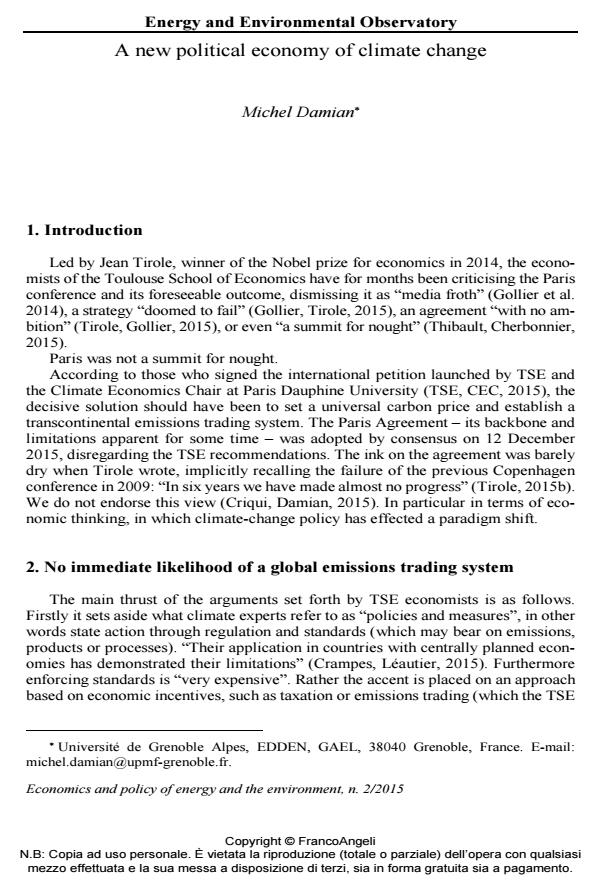A new political economy of climate change
Titolo Rivista ECONOMICS AND POLICY OF ENERGY AND THE ENVIRONMENT
Autori/Curatori Michel Damian
Anno di pubblicazione 2016 Fascicolo 2015/2
Lingua Inglese Numero pagine 10 P. 5-14 Dimensione file 153 KB
DOI 10.3280/EFE2015-002001
Il DOI è il codice a barre della proprietà intellettuale: per saperne di più
clicca qui
Qui sotto puoi vedere in anteprima la prima pagina di questo articolo.
Se questo articolo ti interessa, lo puoi acquistare (e scaricare in formato pdf) seguendo le facili indicazioni per acquistare il download credit. Acquista Download Credits per scaricare questo Articolo in formato PDF

FrancoAngeli è membro della Publishers International Linking Association, Inc (PILA)associazione indipendente e non profit per facilitare (attraverso i servizi tecnologici implementati da CrossRef.org) l’accesso degli studiosi ai contenuti digitali nelle pubblicazioni professionali e scientifiche
This article responds to Jean Tirole, winner of the Nobel prize for economics in 2014 and the signatories of the international appeal launched by Toulouse School of Economics and the Climate Economics Chair at Paris Dauphine University who propose setting a universal carbon price and establishing a transcontinental emissions trading system. We hold that the Paris Agreement, which disregarded such recommendations, represents a paradigm shift. The new economy of climate change departs from the standard approach with regard to its economic instruments (emissions prices and quotas), returning to a classical political economy approach in terms of production economics. It confers a strategic role on methods and techniques for cutting emissions, as part of a long-term vision of energy and industrial transition. It is underpinned by the concerted action of States and multiple actors operating on various scales. There can be no magic wand to swiftly reduce greenhouse gas emissions while disregarding the real conditions of States, which all differ in terms of their relative development, technological capacity and political and social situation, not to mention the diversity of their values and priorities. .
Parole chiave:Paris Agreement, climate change, carbon price, carbon trading, political economy, regulation, decarbonization
Jel codes:Q54, Q58, F53
- De Rio 1992 à Marrakech 2016 : le Sud, acteur de la politique climatique Michel Damian, in Revue de la régulation /2016
DOI: 10.4000/regulation.12033
Michel Damian, A new political economy of climate change in "ECONOMICS AND POLICY OF ENERGY AND THE ENVIRONMENT" 2/2015, pp 5-14, DOI: 10.3280/EFE2015-002001